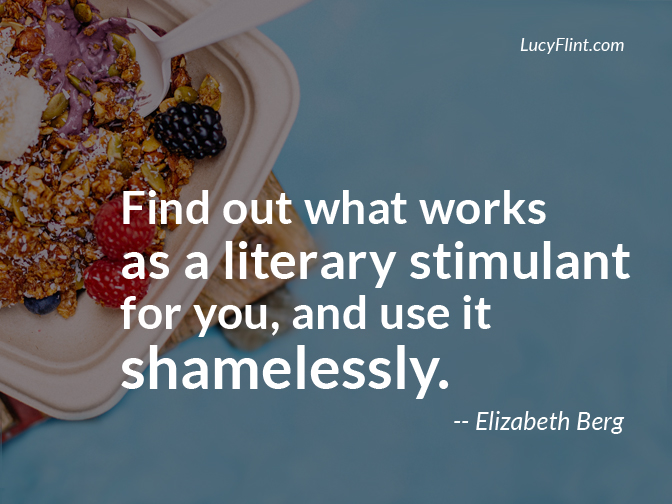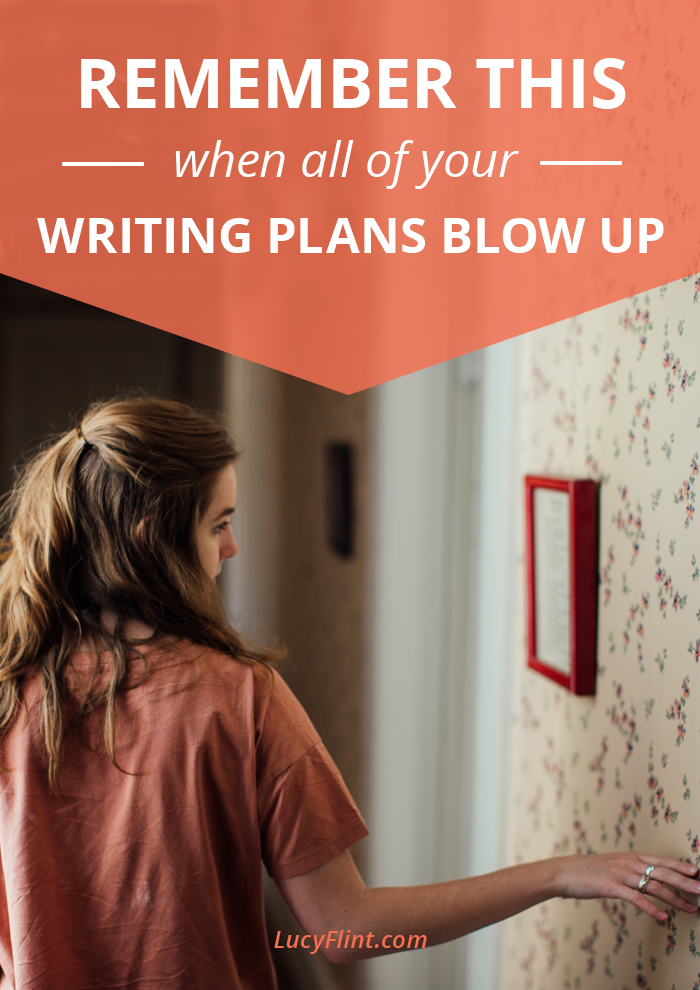If Your Writing Life Feels Like a Series of Face-Plants, This Is What You Need to Know (Or, What to Think When Failure Comes Calling)
/If you've hung out on this blog for a little while, you've probably noticed: I really love inspiring quotes.
They're like little chocolate-covered coffee beans for the writer's heart. When I need an emotional pick-me-up, a good powerful quote can get me moving again.
Which is why it's weird to tell you this: I'm starting to feel a little allergic to one of the most standard-issue inspirational sentiments.
It shows up in a variety of ways, but it has a similar vibe throughout.
It's in the kind of quotes that say: What would you do if you knew you couldn't fail? Or, leap and the net will appear. Or any of the similar ideas running around on Pinterest and Instagram that tell you: to dance like no one's watching, or even if you're afraid of falling you just might fly, or if you miss the moon you'll land among the stars.
Any quote that talks about risking like there isn't a cost: they used to get my wheels turning, used to stir up my boldness, my willingness to dive in.
Lately, though, they've left me feeling flattened.
Because, while I love inspiring words, the truth is that I've done a lot more falling than flying.
Either the net doesn't work or I broke it with my plummeting.
I haven't yet landed on the moon or among the stars, thank you very much.
So I want to dash around on Pinterest, on Instagram, and snag those quotes so that I can draw a footnote underneath them, add a little appendix.
I want to say: Um, it might take a LOT of leaping before you learn what a net even looks like, let alone aim yourself to land in it. In the meantime, there will be some bruises.
It might take a lot of falling in order to learn how to fly.
See, I don't think that those risk-without-worrying-about-the-cost quotes set us up for anything good or healthy. They seem encouraging... but are they telling the truth?
Like I said, my experience doesn't involve a lot of flying. My specialty is actually tumbling. I wipe out like it's my whole job. Frankly, I'm getting pretty good at it. And then what comes next: learning to crawl forward anyhow (after making sure nothing's permanently broken).
From my own experience, and from that of friends, and from the behind-the-scenes conversations with other creatives, I am convinced: This falling down is part of the path of everyone who wants to create.
In other words, get ready to fail.
(Oooh. That's not very chipper, is it. Sorry. But I've actually found some deep and resilient inspiration in considering our failures, so keep reading, my friend! I promise this gets happier.)
Yes, it is dangerous to let our fears stop us from creating. And I understand, that's what those inspirational quotes are trying to address. They want to get us moving anyway!, and that's great.
But I'm convinced that it's equally dangerous to pretend that hard landings don't exist. That falling doesn't happen a LOT.
In other words: I don't want to fear failure, but I also don't want to pretend that it can't happen.
Well, shoot. So ... now what? What's the solution?
I think that the best way forward, in the face of all this, is to change our focus, and to change our definitions.
For starters, whenever we bring up the idea of "failure," it means that we're focused on the outcome. On the result of the thing that we do.
Obviously it's good to care about the result of our work. Plenty of us are looking for an audience one day, for people who will encounter—and appreciate!—our work. We'd like that whole exchange to turn out well, and that is totally fine and as it should be.
BUT.
I know that I can get really, really preoccupied with the result of my work. I can care about it waaaay too much and way too soon. And I isolate the result from the much bigger, much more important thing:
The process of doing the work itself. The making. The writing.
After all, isn't that process what we are actually committed to? The day in, day out, showing up, learning more, trying again, adjusting, evolving, getting better ideas, trying new techniques, finding more and more of what we want to say.
That's what we're in this for, am I right?
When we get over-anxious about the outcome, it's easy to have forgotten it: we're not in this for the outcome of a single piece. Which means, this isn't a pass/fail game. It's a whole lot broader than that.
So that's part of what we have to remember, when we get hung up on the idea of "what if I fail."
But the even bigger thing to attack here is our whole definition of failure itself.
Take a sec and think about it: What does failure mean?
What does it really mean to you? What are all the hairy, fanged, ugly things that it has come to mean ... and what is it really, when you take the big scary costume off of it and see it for what it is?
Where is its power really coming from, my dear?
In Brooke Castillo's ah-mazing podcast, she tackles failure in an incredibly inspiring episode. (It's only 27 minutes long and it will rearrange your life, so give it a listen!!)
One thing she points out is the true definition of failure. What is failure really? It's this: Not meeting expectations.
That's it.
That's IT. That is all it is.
I expected my book to sound better than this, I expected that the trilogy would kinda magically pull itself together after I reread all the drafts, I expected that four drafts would be enough for this project, I expected to research by osmosis instead of actually doing it, I expected worldbuilding to take care of itself.
I expected it to go faster, easier, simpler. I expected to feel smarter, to work more quickly. I expected to be done by now.
Those are a bunch of the expectations currently running around in my head, and yes, these same unsatisfied expectations are the seeds of the big ugly failure weed that's taking up space in my mind.
THIS is why I've been feeling like a failure: because I've had all these expectations—pretty much not based on anything real. They've just kind of happened, without any real intention from me.
I just expected things to go differently. They didn't. And then I feel like a failure.
Okay, friends: Hands up if this describes what's happened in your writing life too?
I don't know about you, but it helps me SO MUCH to realize that I've fallen into these expectations without meaning to, and then I've let them determine this weird creeping sense of failure in my writing life.
... Which usually shows up in my head around midnight and then torments me for an hour. SUPER FUN.
When we arbitrarily decide what our writing lives "should" look like, how projects should go, how fast or how smooth or how easily, how many drafts—we are setting ourselves up for a sense of failure.
You tracking with me?
And then we take that failure, and we make it mean really huge, awful things about ourselves, our work, our potential, our talent, our prospects. We pile the miserably onto the failure for a nice sense of failed miserably.
We let it damn us into silence, and then we declare the whole experience one big crash-and-burn.
(Or mayyyyybe that's just me. But seriously, this is how I roll if I'm not paying attention to what's happening in my mind.)
We give the concept of failure all this power that it really doesn't have to have. We draw the wrong conclusions from it. Which makes it hurt so much more than it needs to, and which makes it paralyze us, when what we most need is the opposite of paralysis:
We need to keep going!
I know it can be hard to root out all our expectations about how work should go. Mine tend to hide, until they leap out in their failure-suits to gnaw on my sense of worth. (Not cool, guys.)
But it can help to do a kind of "Expectation Dump." Grab a sheet of paper, and just see what comes up. Try to jot down 10 expectations that you have about your work, whatever your work-in-progress is right now.
Here's the thing: I'm not saying expectations are terrible. It's good to have aims, and to aim high. After all, I do want my trilogy to just sing when I'm done with it. I do want the worldbuilding to be spot on, and I want it to sound better than it currently does. (A LOT better, please.)
The thing that traps me in Failureville is when I start saying, It should have happened already, It should have been sooner, I should know better, I should learn faster, I should, I should, I should ...
or else I'm a failure.
That's when things get sick, and flat-out untrue.
Here's my favorite anti-failure mantra. Here's what we meet all this with. Here's what we sing at the tops of our lungs from our writing desks:
I am going to learn from this.
So simple, but oh-so effective.
Deciding that everything is about learning just kind of deflates the whole "I should have by now" parade.
My trilogy doesn't sing right now. It doesn't even creak pleasantly. But you know what? I'm going to learn from this.
The backstory for book one has waaaaaay more holes in it than I feel like I can manage, but guess what: I'm going to learn how to fill them.
I'm going to learn how to make my protagonist stronger, how to smooth out my clunky worldbuilding, how to nail dialogue.
I'm going to keep. on. learning.
When we decide to keep learning, failure loses all its power. All it can do is kind of blink and say, You expected something different than this ... do you, um, care? And then it sees that you're taking notes and that you have your power-student face on, and you're going to use the mistake as a fresh jumping off point ...
Well, it doesn't really know how to counter that.
Yes, it can still sting. It can sting a lot.
But when we roll up our sleeves and decide to be learners instead of "failures," we'll remember this gorgeous thing about the creative life:
The lovely thing about writing is that you can do it from anywhere. From the tip top, or right down at the bottom of all things. You can write your way out of any hole at all.
Sometimes with bruises, abrasions, sore places. When breath comes back, you're reaching around for your pen again, before you even sit up.
So even if you don't know how to fix your work-in-progress right now, you can practice something else. You can fill journals, you can make dozens of funny lists, you can do creative writing exercises ... and maybe discover a new project to ease the pressure from your first one—who can tell?
When we defuse expectations and remove their power, when we shrink the sway of failure, when we see ourselves as Learners with pens in hand:
We get pretty dang invincible.
And that's exactly the kind of space I want to work from.
Okay. I have a bunch of lionhearted links and goodies for you, so if you want to go further on this topic, check these amazing things out:
First, seriously, listen to Brooke Castillo's podcast episode on How to Fail. It will rock your world.
Then, check out this lovely podcast episode of Elizabeth Gilbert interviewing Brené Brown. This is where I first heard people taking to task the quotes about "leap and the net will blah blah blah" and also "what would you do if you couldn't fail." These ladies get real clear about how failure feels in the creative process... plus they're just incredible. You'll love this one.
Bonus: If you're an Elizabeth Gilbert fan, check out this mini TED talk (just 7 minutes!) on Success, failure, and the drive to keep creating. SUCH a good reminder.
And for an INCREDIBLE sense of perspective, jump into this video, as Marie Forleo interviews Bryce Dallas Howard: If you pick up at the 11:48 mark, you'll hear Bryce Dallas Howard explain that it takes real working actors (in other words, not wannabes, but legit actors) an average of 64 auditions to get a role. SIXTY-flipping-FOUR. How is that for a mind-bender? And a redefinition of what failing is?? After all, auditions 1-63 are not failures; they're the steps you have to take to get a job. I loved how Howard talked about this in a really matter-of-fact way. SO refreshing and super inspiring.
Finally, finally: yes, dealing with a sense of failure isn't fun, and even when we get clear on expectations versus a sense of failure, and even when we get our Learning Hats on ... well, it can still sting. For that, I recommend an all-out dance party. Shake it off, and crank up the volume on this song: Sia's Never Give Up.
You are a dauntless, lionhearted learner. A maker of many things. Don't forget it.




























